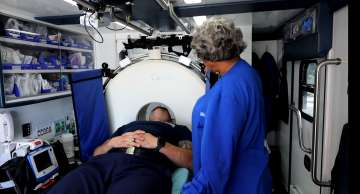How It Works

The Mobile Stroke Unit (MSU) is staffed by a specialty care team comprised of a Stroke Neurologist, Critical Care Transport Nurse, CT Technician, and Paramedic. When an individual calls 911 and says someone is having a stroke, or mentions symptoms that would indicate a potential stroke, our MSU will be dispatched to the scene of the patient alongside another 911 Emergency Response Unit. On-scene, both the MSU team and the other emergency response unit will assess the patient to determine if the patient is likely to be having a stroke. If so, the patient will be placed inside the MSU.
The Stroke Neurologist, either in-person or via an advanced telehealth system, will further assess the patient to determine the severity of the stroke. During this time, the Critical Care Transport Nurse will perform a few simple lab tests on the patient using handheld testing devices, and the CT Technician will prepare for the patient’s imaging scan. All of the results from the lab tests, CT scan, and patient evaluation will be documented in the patient’s electronic medical record, which is immediately viewable by the Stroke Neurologist over the secure wireless network in the MSU.
The Stroke Neurologist will use this information to determine the type of stroke the patient is having. If the patient is having an ischemic stroke (where the brain is deprived of oxygen-rich blood due to a clot or blockage), the Nurse can administer a clot-busting medication to the patient that is effective at restoring blood flow to the brain. If the patient is having a hemorrhagic stroke (where blood is escaping into areas of the brain), the Nurse can administer medications that slow and reverse the hemorrhage. After the treatment has been given in the MSU, the team will transport the patient to the nearest approved stroke center for further care.
Every minute during an ischemic stroke, nearly 2 million brain cells die by being deprived of the oxygen-rich blood they need. By delivering life-saving treatments to stroke patients as fast as possible through the MSU, patients are given the best possible chance to have high-quality health outcomes and reduced disability over the long term.